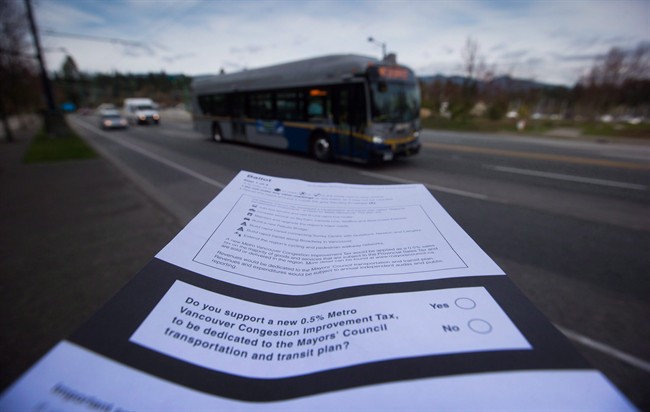VANCOUVER – Residents of Metro Vancouver were handed an unprecedented opportunity to vote for new and improved regional transportation in a transit-tax plebiscite that both sides are confident of winning.

Just ahead of the results being released, a spokesman for the Mayors’ Council on Regional Transportation said he expected the count to be close but predicted the Yes side would prevail.
“We did a good job, given…nobody’s ever gone through a transit and transportation plebiscite before,” said Greg Moore, the mayor of Port Coquitlam, B.C.
“We had quite a job to break down a very comprehensive plan into what it means for neighbourhoods, communities and the economy.”
Moore described the campaign as a six-month sprint, noting council would have benefited from more time to make its case. He added mayors would not have chosen a vote for securing funding, but were “mandated” by British Columbia’s provincial government.
READ MORE: Transit plebiscite results to be released at the end of June
Jordan Bateman, who spearheaded the No strategy on behalf of the Canadian Taxpayers Federation, refrained from predicting the outcome, but assessed their campaign as unfolding “almost flawlessly.”
“No Yes-side person has come out and sounded confident they’re going to win,” he said. “It’s fair to say that their pessimism gives us optimism.”
Bateman said his side gained traction because it presented a “clear” message that the public shouldn’t entrust more money to TransLink, the transit authority. He reflected that many members of the public with personal stories of transit problems disseminated the No message using social media, even without prompting.
He said his campaign considered holding a public rally as the “ace up its sleeve,” but ultimately found it unnecessary.
Full transit plebscite coverage
The ballot question asked citizens if they support adding 0.5 per cent to their sales tax to pay for a decade-long, $7.5-billion system upgrade including more buses, road development, light rapid transit and a new bridge.
The package covers 21 municipalities, an electoral area and a First Nation. It’s aimed at accommodating about one million new people expected to move into the area over the next 30 years.
The latest interim count showed 698,900 ballots had been screened among a possible 1,562,474 voters. That amounts to 44.7 per cent of those eligible. Voting closed May 29 and Elections BC has been tallying the final result ever since.
The Chief Electoral Officer is expected to report the final tabulation to the Speaker of the Legislative Assembly by the end of this month or early July.
Here’s how the results might unfold, according to Moore and Bateman.
Yay to the regional transportation plan:
If citizens voted Yes, the Mayors’ Council starts developing an implementation strategy — essentially, working out the nuts and bolts for procuring transit vehicles and starting construction projects.
Provincial politicians must pass legislation to enshrine the new tax. Tax collection would likely not begin until 2016.
Bateman said his organization would continue to push to reform TransLink.
Nay to the regional transportation plan:
If citizens voted No, a funding source will not be generated for transit upgrades.
The next step by the Mayors’ Council would likely involve discussing options, including working with the provincial government to interpret the message sent by voters.
Municipalities would individually hash out the implications on their community plans. For example, North Vancouver Mayor Richard Walton has indicated his council would re-visit its designs on becoming a transit-oriented community, which might involve rezoning.
Specific construction priorities would also be left in limbo, such as the replacement of the Pattullo Bridge that connects Surrey, New Westminster and Burnaby. TransLink has already committed $100 million to maintaining the bridge for up to 10 more years, but its fate after that is unknown.
The fortunes of other major projects — including Vancouver’s Broadway subway line and light rail for Surrey — would be up in the air. Those projects depend on one-third funding commitments from the provincial and federal governments, and that funding could be made inaccessible if the region doesn’t provide its own one-third share.
Bateman disputed that the cash couldn’t be found through efficiencies, tolls and pledges from major political parties leading up to the October federal election. He expects many projects will progress within the existing funding envelope, even if they don’t proceed as quickly as the mayors’ timeline.
“What will happen is you’ll see the mayors’ doomsday prediction fall completely flat,” he said.
Moore said he’ll sigh with relief if the plebiscite passes, but won’t assign blame if it fails.
“If this turns out to be a No and in my community bus-service levels go down, I will say that the citizens spoke that they didn’t want any new funding for transit,” he said.





Comments